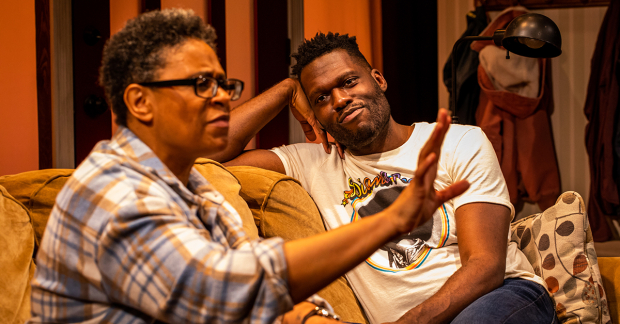Review: The Songs Can Help You Reminisce in R. Eric Thomas's Backing Track

(© Wide Eyed Studios)
Playwright R. Eric Thomas is having a big moment, with three new plays premiering this spring: The Folks at Home at Baltimore Center Stage and Crying on Television at Everyman Theatre (both in his hometown), and Backing Track, commissioned by the Arden Theatre in Philadelphia, where he has lived for many years.
The central character is Avery, played by the charismatic Brenson Thomas (the strongest singer in the company). He works on a cruise ship, and as a lonely thirtysomething, he worries that he'll never find love. His mother, Mel (the excellent Melanye Finister), is mourning both the death of her wife and the symbolic loss of Tina's bar, a lesbian karaoke joint where Avery's two mothers met and which is about to close. Avery's pregnant sister (Danielle Lenee) is an underwritten but intriguing character — in her apparent disgust with the US ("I'm nobody's patriot," she says) she has moved to Canada where she met her husband, Rene (Joseph Ahmed), a solar energy enthusiast. Enter Abraham (Carl Hsu), Avery's Grindr crush, who supposedly lives in Greece but in fact lives around the corner. His sister (Bi Jean Ngo) is the neighborhood guardian and keeps bringing presents to Mel, hoping to persuade her to clean up her yard.
Built almost like a Shakespearean comedy, Backing Track has two sets of brothers and sisters, and a recognition scene where strangers turn out to be no strangers at all. The play is a little thin for its two-plus-hour running time, and many scenes have a tendency to feel like individual skits that alternate between one-liners and earnest debates. The topics range from neighborhood gentrification, the movie Titanic ("I hate Titanic. Boo me if you must."), solar panels, laundry, home ownership, Lyft, and patriotism. That's a lot of topics to conquer.
Mel's predictable technophobia is the source of the play's humor, and there is much technology employed, but to little effect, in the complicated stage design of Chris Haig. Stage right is a tiny karaoke set, first representing part of the cruise ship and then Avery's house, while stage left is an area that characters wander into without our knowing whether it's a kitchen or an offstage prop room or Abraham's house. High above this is a projection of a vinyl record that slowly turns to announce the year: 2018 is "Side A." Various characters sing, well or not, separately or not, and the music is integrated into the plot as the characters backtrack into their past.
Rebecca Wright's direction lacks fluency, with awkward gaps between scenes. Although all the characters seem likable enough, there isn't really any conflict to create tension, and the performances are marred by exaggerated gestures, particularly Hsu and Ngo. Finister and Thomas are the anchors of the cast, conveying the humanity of their characters.
Ultimately, Backing Track is a nostalgia play-with-music, the idea being that songs can take you back. Thomas's program note says more plainly, "We have new forms of passing along music and the complete thought that is a list of songs, but as a culture we really peaked with the mixtape." If you share this view, you may be one of the many people in the audience who leaped to their feet.










